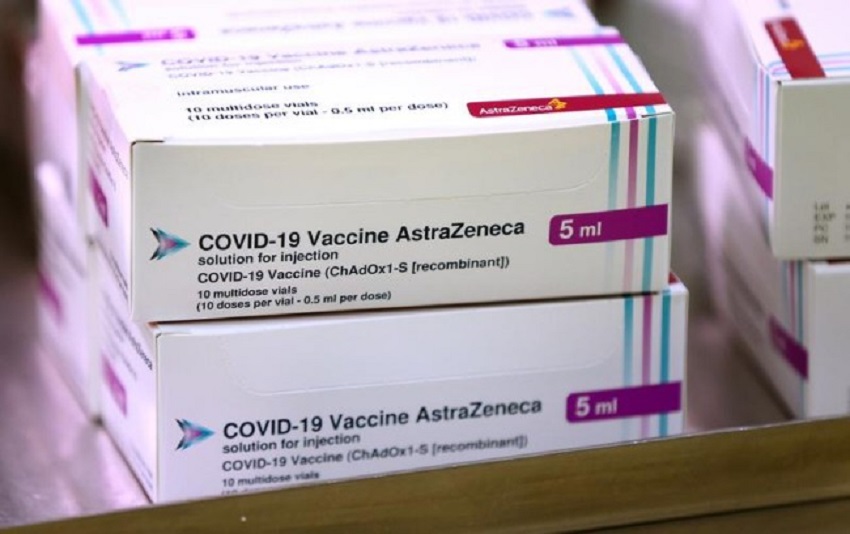General
AstraZeneca Vaccine Will Arrive Nigeria in Batches—NPHCDA

By Ahmed Rahma
The Executive Director of National Primary Health Care Development Agency (NPHCDA), Dr Faisal Shuaib, has said Nigeria AstraZeneca vaccine will arrive in Nigeria in batches.
Nigeria, according to him, has been allocated 16 million doses and from late February 2021, the jabs will begin to enter the country for the use of Nigerians.
At the Presidential Task Force on COVID-19 briefing on Monday, the health expert said Nigeria will also stick with the vaccine despite South Africa rejecting it based on its epidemiological and equity assessment done by the World Health Organisation (WHO).
“As earlier communicated, Nigeria is no longer expecting the 100,000 doses of the Pfizer/BIONtech vaccine through the COVAX facility but has been allocated about 16 million doses of the AstraZeneca vaccine.
“This was based on epidemiological and equity assessment done by WHO,” he said.
He noted that Nigeria was considered one of the countries ready to receive the Pfizer vaccine but because the distribution intended to achieve public health value, it was not practical to provide every capable country with the vaccine due to its limited quantity.
“As stated by the WHO regional director, a number of factors were considered in allocating the small quantity of 320,000 doses of the Pfizer vaccine to 13 countries in Africa.
“These include mortality rate from COVID-19, numbers of new cases, populations of the countries involved and availability of appropriate cold chain equipment,” he said.
According to the official, Nigeria is by no means ahead of countries such as South Africa in terms of mortality or incident rate of COVID-19 and is not the least populated in comparison to the other countries.
Commenting on the replacement of Pfizer vaccine with AstraZeneca, he said, “Replacement of the initial 100,000 doses of the Pfizer vaccine with 16 million doses of the AstraZeneca vaccine is in fact a welcome development as it will enable a wider reach of our population and is a better option using our routine cold chain system, though we still have an ultracold chain capacity that would have been able to store more than 400,000 doses of the Pfizer vaccine,” he explained.
According to Shuaib, Nigeria has yet to find the South African variant of COVID-19 in its population, and will continue with plans to distribute the AstraZeneca vaccine. He said that authorities were searching test samples for the South African strain and subjecting samples from travellers returning from the United Kingdom and South Africa to further genomic sequencing.
“We will continue to work with regulators to ensure that only a vaccine that is effective against the predominant COVID-19 strain in Nigeria will be administered.
“As you may be aware, South African Government has suspended vaccination with the Oxford/Astrazeneca vaccine in response to findings from a study which showed that the vaccine was less efficacious against the B.1.351 strain of the COVID-19 virus which is the predominant strain in South Africa.”
The executive director said that Nigeria had yet to isolate the strain. “The Nigeria Centre for Disease Control, working with Nigeria Institute of Medical Research and others, will intensify search for this strain from samples collected. “In the meantime, we will continue to work with NAFDAC to ensure that only a vaccine which is effective against the predominant COVID-19 strain in Nigeria will be administered,” he said.
General
EFCC Re-Arraigns ex-AGF Malami, Wife, Son Over Alleged Money Laundering

By Adedapo Adesanya
The Economic and Financial Crimes Commission (EFCC) has re-arraigned former Attorney-General of the Federation (AGF), Mr Abubakar Malami (SAN), his wife, Mrs Asabe Bashir, and son, Mr Abdulaziz Malami, on money laundering charges.
They were brought before Justice Joyce Abdulmalik of the Federal High Court in Abuja, following the re-assignment of the case to the new trial judge.
Upon resumed hearing, EFCC’s lawyer, Mr Jibrin Okutepa (SAN), informed the court that the matter was scheduled for defendants’ re-arraignment.
“The matter is coming before your lordship this morning for the very first time. I will be applying for the plea of the defendants to be taken,” he said.
Mr Okutepa equally applied that the sums listed in Counts 11 and 12 be corrected to read N325 million instead of N325 billion for Count 11, and N120 million instead of N120 billion for Count 12.
When it was not opposed by the defence lawyer, Mr Joseph Daudu (SAN), Justice Abdulmalik granted the oral application by Mr Okutepa.
The defendants, however, pleaded not guilty to the 16 counts preferred against them by the anti-graft agency bordering on money laundering.
Justice Obiora Egwuatu had, on February 12, withdrawn from the case shortly after the civil case filed by the EFCC was brought to him.
The case was formerly before Justice Emeka Nwite, who sat as a vacation judge during the Christmas/New Year break.
After the vacation period, the CJ reassigned the cases to Justice Egwuatu, who had now recused himself, before it was reassigned to Justice Abdulmalik.
The former AGF, his wife, and son were earlier arraigned before Justice Nwite on December 30, 2025.
While Malami and his son were remanded at Kuje Correctional Centre, Asabe was remanded at Suleja Correctional Centre before they were admitted to N500 million bail each, on January 7, with two sureties each in the like sum.
General
INEC Shifts 2027 Presidential, N’Assembly Elections to January 16

By Adedapo Adesanya
Nigeria will hold next year’s presidential and National Assembly elections a month earlier than planned, after the Independent National Electoral Commission (INEC) revised the polling schedule.
The elections will be held on January 16, instead of the previously announced date of February 20, INEC said in an X post, signed by Mr Mohammed Kudu Haruna, National Commissioner and Chairman, Information and Voter Education Committee.
There were also changes to the Governorship and State Houses of Assembly elections initially fixed for Saturday, March 6 2027, in line with the Electoral Act, 2022, have now been moved to Saturday, February 6, 2027.
The electoral commission said the changes were caused by the enactment of the Electoral Act, 2026 and the repeal of the Electoral Act, 2022, which introduced adjustments to statutory timelines governing pre-election and electoral activities.
“The Commission reviewed and realigned the schedule to ensure compliance with the new legal framework,” it said.
INEC said party primaries (including resolution of disputes) will commence on April 23, 2026 and end on May 30, 2026, after which Presidential and National Assembly campaigns will begin on August 19, 2026, while Governorship and State Houses of Assembly campaigns will begin on September 9, 2026.
It noted that campaigns will end 24 hours before Election Day, and political parties have been advised to strictly adhere to the timelines.
INEC also stated it will enforce compliance with the law.
The electoral body also rescheduled the Osun Governorship election which was earlier scheduled for Saturday, August 8 2026, by a week to Saturday, August 15, 2026.
INEC noted that some activities regarding the Ekiti and Osun governorship elections have already been conducted, and the remaining activities will be implemented in accordance with the Electoral Act, 2026.
Speaking at a news briefing in Abuja two weeks ago, the chairman of INEC, Mr Joash Amupitan, expressed the readiness of the commission to conduct the polls next year.
The timetable issued by the organisation for the polls at the time came when the federal parliament had yet to transmit the amended electoral bill to President Bola Tinubu for assent.
Later that week, the Senate passed the electoral bill, reducing the notice of elections from 360 days to 180 days, while the transmission of results was mandated with a proviso.
General
NIMASA Rallies Stakeholders’ to Develop National Action Plan

By Adedapo Adesanya
The Nigerian Maritime Administration and Safety Agency (NIMASA) has pledged its commitment to provide the regulatory leadership, technical coordination, and stakeholder engagement required to successfully develop and implement a robust National Action Plan on maritime decarbonization in Nigeria.
The Director General of the agency, Mr Dayo Mobereola, made this known during the National Stakeholders’ workshop on the development of a National Maritime Decarbonization Action Plan, further describing the workshop as a critical step in actualising the Federal Government’s blue economy and climate objectives.
Represented by the Executive Director, Operations, Mr Fatai Taiye Adeyemi, the NIMASA DG underscored the significance of the IMO GreenVoyage2050 Project, a technical cooperation initiative /designed to support developing countries in implementing the IMO GHG Strategy.
According to him, the National Action Plan being developed will reflect national realities, leverage existing capacities, address identified gaps, and align with broader economic and environmental priorities of the federal government.
Mr Mobereola stressed that “this transition is not merely about compliance with international obligations, it is about safeguarding our marine environment, protecting public health, strengthening the blue economy, and ensuring that our maritime industry remains competitive and future-ready”, the DG said.
Also speaking at the event was the Technical Manager of the IMO GreenVoyage2050 Project, Ms Astrid Dispert, who highlighted that the overarching objective of the initiative is to advance a coherent and globally aligned regulatory framework to accelerate maritime decarbonization.
She also emphasised that NIMASA plays a pivotal role in driving the project at the national level.
The IMO GreenVoyage2050 Project provides technical expertise and institutional support to assist countries in developing and implementing National Action Plans that promote sustainable shipping practices, encourage investment in clean technologies, and strengthen capacity for long-term emissions reduction.
Through this collaboration, the federal government is advancing deliberate steps towards maritime decarbonization, reinforcing its commitment to global climate goals and ensuring a cleaner, greener, and more sustainable future for the sector.
-

 Feature/OPED6 years ago
Feature/OPED6 years agoDavos was Different this year
-
Travel/Tourism10 years ago
Lagos Seals Western Lodge Hotel In Ikorodu
-

 Showbiz3 years ago
Showbiz3 years agoEstranged Lover Releases Videos of Empress Njamah Bathing
-

 Banking8 years ago
Banking8 years agoSort Codes of GTBank Branches in Nigeria
-

 Economy3 years ago
Economy3 years agoSubsidy Removal: CNG at N130 Per Litre Cheaper Than Petrol—IPMAN
-

 Banking3 years ago
Banking3 years agoSort Codes of UBA Branches in Nigeria
-

 Banking3 years ago
Banking3 years agoFirst Bank Announces Planned Downtime
-

 Sports3 years ago
Sports3 years agoHighest Paid Nigerian Footballer – How Much Do Nigerian Footballers Earn












